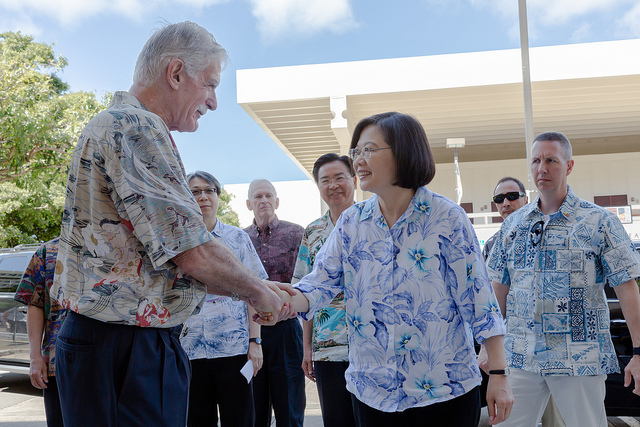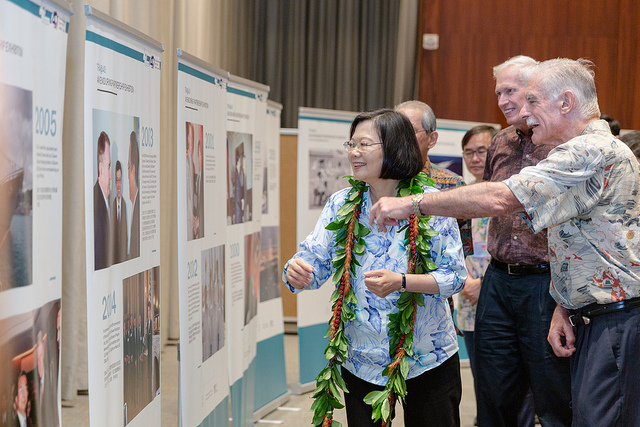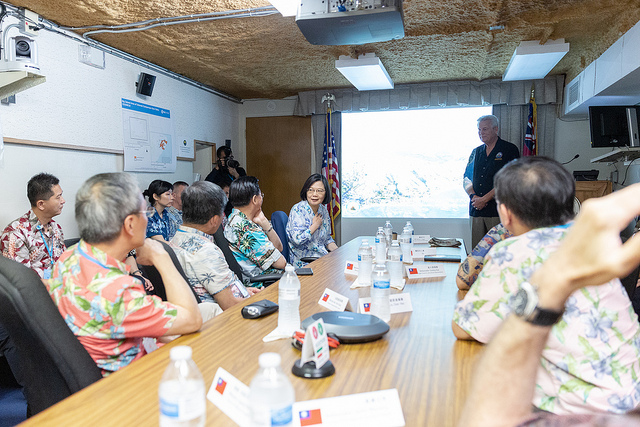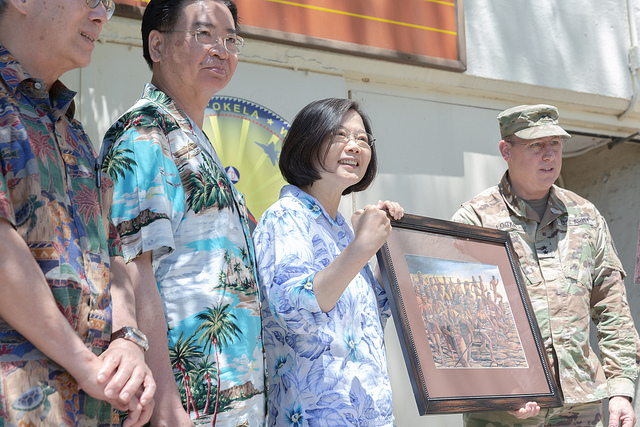News & activities
 News releases
News releases
On the morning of March 27 (early morning of March 28 Taipei time), President Tsai Ing-wen attended the opening ceremony of the East-West Center's (EWC) special exhibition commemorating the 40th anniversary of the Taiwan Relations Act, and visited the Hawaii Emergency Management Agency (HI-EMA).
After arriving at the East-West Center, President Tsai was accompanied by American Institute in Taiwan (AIT) Chairman James Moriarty, EWC Chairman Richard Turbin, and Taiwan's Representative to the United States Stanley Kao (高碩泰) on a tour of the exhibition titled TRA@40, which was jointly organized by the Taipei Economic and Cultural Representative Office in the United States and AIT. The 40 images on display at the exhibition show how Taiwan-US friendship has evolved and strengthened over the past 40 years.
President Tsai made it a point to tell the media that in addition to displaying numerous photographs, the EWC's special exhibition on the 40th anniversary of the Taiwan Relations Act plays witness to the 40 years of interactions between Taiwan and the United States since the Act was passed. She acknowledged that most people probably remember Taiwan's isolation when the United States announced it would sever diplomatic ties with us in 1979, and how US Congress immediately began advocating for the legislation of the Taiwan Relations Act.
The president pointed out that the Taiwan Relations Act became the cornerstone of relations between Taiwan and the United States after its passage by the US Congress in 1979. China has continued to challenge the Taiwan Relations Act over the past 40 years, but the determination of the Taiwanese people to preserve our democratic freedoms, as well as the staunch friendship of the United States, have allowed us to bring our bilateral relations to a higher, more meaningful level.
She continued by stating that in fact, Taiwan-US relations are continually improving and becoming closer. The strongest testament to this process visible at the exhibition, she said, is a photo of President Ronald Reagan signing a memo with the words: "We keep our promises to Taiwan. Period." In other words, she said, the US commitment to Taiwan under the Taiwan Relations Act is beyond doubt. President Reagan's Six Assurances to Taiwan are also an important part of the foundation that underpins Taiwan-US relations, she added, so her visit to this exhibition was especially meaningful.
President Tsai stated that Taiwan is facing a number of challenges, mainly from China. Since taking office in 2016, her administration has maintained a strong position on cross-strait relations and adhered to their commitment to maintain the status quo, she said. Taiwan has acted as a contributor to peace and stability in the region, so it is unfortunate that China has continued to attempt to alter the status quo.
She further stated that throughout this entire process, many of our like-minded friends, including the United States, have supported us and helped us to defend ourselves and participate in international organizations. At the same time, like-minded countries have worked with us in the Indo-Pacific to face regional issues together, including humanitarian aid, women's empowerment, and national governance. Thus, Taiwan has come to play an important role in the Indo-Pacific region.
With the 40th anniversary of the passage of the Taiwan Relations Act upon us, the president emphasized, we must reflect on our past while looking to the future. Taiwan will continue to strengthen relations with the United States under the Taiwan Relations Act, and will continue to play an active role in the Indo-Pacific region alongside other like-minded countries to maintain regional stability, peace, and development.
President Tsai then toured HI-EMA accompanied by Hawaii Adjutant General Major General Arthur J. Logan, where she learned about the emergency response center's core mission and operating conditions.
Also in attendance were Taiwan's Foreign Minister Joseph Wu (吳釗燮), National Security Council Deputy Secretary-General Tsai Ming-yen (蔡明彥), other delegation members, and Representative to the United States Stanley Kao.












